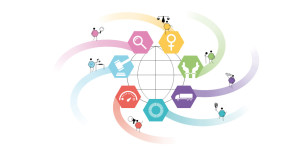Sustainability has multiple dimensions, as Brundtland Commission’s report “Our Common Future” established. The foundation for the current understanding of sustainability is a three-legged stool involving people, the planet and profits. Actions concerning these issues help companies to reduce risks and put them in a better position to capitalize on opportunities and create benefits to their shareholders, consumers, employees and the communities.
In this line, the World Economic Forum has launched a white paper on business sustainability. This joint statement is the product of a collective effort by seven Global Agenda Councils:
- Human rights: companies now are beginning to address these issues as they relate to their core businesses, setting clear standards and building internal systems to fulfill these commitments and providing accessible remedies when these standards are not met.
- Logistics and supply chain systems: due to globalization, global retailers and manufacturers have a responsibility not only to their shareholders but also for the working conditions and the environmental practices that occur throughout the entire supply chain.
- Climate change: corporations today are at the forefront of actions and solutions. By taking a step, they discover and capture opportunities to reduce costs, minimize risks and increase resilience.
- Sustainable consumption: a sustainable model of consumption is needed due to address the imbalance on this point. Companies will need to play a role in educating consumers to change their behavior when buying, using and discarding products or services. By capitalizing on these opportunities, companies will create sustainable benefits to society and the environment, as well as to themselves, the economy and individual consumers.
- Women’s empowerment: governments and businesses should ensure that women have equal access to jobs, wages and opportunities for advancement. When women are fully engaged, provided with resources and given power in decision-making, they are important actors in promoting best practices and developing sustainable growth and clean environments.
- Rule of law: secure property rights, transparent regulation, predictable tax systems, independent judiciaries, fair competition regimes… These vital concepts for commerce depend on rule of law. In addressing these challenges, a company may find itself engaged with other constituencies in ad hoc initiatives that require governance notwithstanding the absence of effective rule of law. Initiatives that incorporate these principles can benefit from greater legitimacy and sustainability over time.
- Anti-corruption & transparency: corruption is a pernicious disease affecting civil society and the global economy. It is bad for business and very bad for sustainable development, the advancement of the human condition, and threatens the sustainability of business itself. A strong corporate culture is a prerequisite to the establishment and sustainability of trust in the business.
These contributions of the various Councils of the Global Agenda feature a picture of the sustainability of the business that can begin to inform business decisions and creating new business models. To progress in this area it will be necessary the efforts and contributions of a diverse set of actors.
It is increasingly understood that sustainable business models improve long-term profitability and social legitimacy of corporations. Companies and their stakeholders, including investors, are now recognizing that financial success and survival of the company depends on their contribution to the development of a clean environment and human rights societies in which they operate.
United Nations Secretary-General Ban Ki-moon has repeatedly recognized that achieving these objectives will require businesses and investors to go beyond short-term shareholder value to a longer-term consideration that takes into account the perspectives of a broader array of stakeholders. While most companies are at an early stage of development of practical business models in this aspect, there is no doubt that the concept of sustainability is gaining currency. Now is time to move the debate forward and to adopt policies and practices consistent with an integrated understanding of business sustainability
To read the full Paper, click here.
